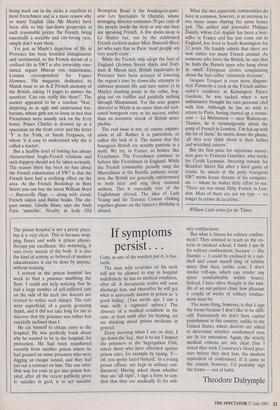If symptoms
persist . .
The prison hospital is not a pretty place, but it is very clean. This is because mop- ping floors and walls is prison physio- therapy par excellence: like swimming, it uses every muscle of the body. It is also the kind of activity so beloved of modern educationists: it can be done by anyone, without training.
I arrived in the prison hospital last week to find a prisoner swabbing the floor. I could not help noticing that he had a large number of self-inflicted cuts on the side of his neck (we doctors are trained to notice such things). The cuts were superficial, of a purely gesturing depth, and it did not take long for me to discover that the prisoner was rather less suicidally inclined than I.
He cut himself to obtain entry to the hospital. He was perfectly frank about why he wanted to be in the hospital: for protection. He had been transferred recently from another prison where he had grassed on some prisoners who were digging an escape tunnel, and they had put out a contract on him. The one infal- lible way for cons to get into prison hos- pital, after all the recent publicity given to suicides in gaol, is to act suicidal.
Cons, as one of the warders put it, is bas- tards.
The man with scratches on his neck will not be allowed to stay in hospital indefinitely: he has no medical condition, after all. A therapeutic zealot will soon discharge him, and thereafter he will get what is universally known in prison as 'a good hiding'. (Two weeks ago, I saw a man with a ruptured spleen.) The absence of a medical condition in his case, at least until after his beating, set me thinking about prison medicine in general. Every morning when I am on duty, I `go down the Seg', that is to say I inspect the prisoners in the Segregation Unit, where those who have offended against prison rules, for example by saying, T- off, you spotty faced bastard,' to a young prison officer, are kept in solitary con- finement. Having asked them whether they are 'all right', I sign a form to con- firm that they are medically fit for soil- tary confinement.
But what is fitness for solitary confine- ment? They omitted to teach us the cri- teria in medical school. I think I am fit for solitary confinement, because — like Hamlet — I could be enclosed in a nut- shell and count myself king of infinite space (but then, unlike cons, I don't smoke roll-ups, which can render any space uninhabitable within hours). Indeed, I have often thought in the mid- dle of an out-patient clinic how pleasant a couple of weeks of solitary confine- ment must be.
The main thing, however, is that I sign the forms because I don't like to be diffi- cult. Fortunately we don't have capital punishment in this country, unlike in the United States, where doctors are asked to determine whether condemned men are fit for execution. Again, the strictly medical criteria are not clear (but I noted they took Ceausescu's blood pres- sure before they shot him, the modern equivalent of confession). If it came to the crunch, however, I'd probably sign the forms — out of habit.
Theodore Dalrymple


















































 Previous page
Previous page